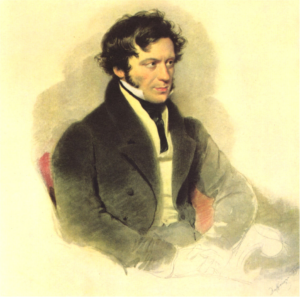Serenade
(Poet's title: Ständchen)
Set by Schubert:
D 920
Schubert did not set the lines in italics (or they were not in the MS version he was working from)[July 1827]
Zögernd, leise,
In des Dunkels nächt’ger Hülle
Sind wir hier;
Und den Finger sanft gekrümmt,
Leise, leise,
Pochen wir
An des Liebchens Kammertür.
Doch nun steigend,
Schwellend, hebend,
Mit vereinter Stimme, laut,
Rufen aus wir hochvertraut:
Schlaf du nicht,
Wenn der Neigung Stimme spricht.
Sucht ein Weiser nah und ferne
Menschen einst mit der Laterne,
Wie viel seltner dann als Gold
Menschen, uns geneigt und hold.
Drum wenn Freundschaft, Liebe spricht,
Freundin, Liebchen, schlaf du nicht.
Aber was in allen Reichen
Wär dem Schlummer zu vergleichen?
Was du hast und weißt und bist,
Zahlt nicht, was der Schlaf vergißt.
Drum statt Worten und statt Gaben
Sollst du nun auch Ruhe haben,
Noch ein Grüßchen, noch ein Wort,
Es verstummt die frohe Weise,
Leise, leise
Schleichen wir uns wieder fort.
Hesitant, gentle,
Under cover of darkness at night
We are here;
And with a softly bent finger,
Gently, gently,
We knock
On our darling’s bedroom door.
But now rising up,
Swelling, lifting,
With a united voice, loud,
We call out full of confidence:
Do not sleep
When the voice of affection speaks!
There was once a wise man who searched far and wide
With a lantern looking for people,
How much rarer than gold
Are people who are favourable and good to us?
Therefore, when friendship and love speak,
Friend, love, do not sleep! –
But of all riches
What can compare to sleep?
What you have and know and are
Does not count, since it is forgotten in sleep.
Therefore instead of words and instead of gifts,
You shall also now have rest;
Just one more little greeting, one more word,
Then the cheerful tune will end,
Gently, gently,
We shall creep away again!
All translations into English that appear on this website, unless otherwise stated, are by Malcolm Wren. You are free to use them on condition that you acknowledge Malcolm Wren as the translator and schubertsong.uk as the source. Unless otherwise stated, the comments and essays that appear after the texts and translations are by Malcolm Wren and are © Copyright.
☙
Themes and images in this text:
Doors and gates Fingers Going to bed Greetings Night and the moon Serenades and songs at evening Songs for special occasions
Many of the pieces that Schubert was commissioned to write for special occasions (birthdays, anniversaries, charity fundraisers etc.) were based on texts by minor hacks and amateurs, but this one is an exception. Franz Grillparzer in 1827 was already on his way to being regarded as one of Austria’s foremost writers. He was also very well connected, both in the worlds of government (he was a civil servant himself) and the arts. Along with Schubert, Grillparzer had been a torch-bearer at Beethoven’s funeral earlier in the year (and he had also written the funeral oration). His cousin was Leopold von Sonnleitner (an old friend and active supporter of Schubert’s), who was engaged to Louise Gosmar (1803 – 1858).
Louise Gosmar’s singing teacher, Anna Fröhlich, arranged for this Ständchen to be performed at the Gosmars’ house in Döbling (in the northern outskirts of Vienna) on Louise’s birthday, 11th August 1827. After Grillparzer had provided the poem Anna Fröhlich showed it to Schubert and asked him to prepare the music. Two days later he handed her a version prepared for mezzo and a male (TTBB) quartet. Schubert had clearly been asked to prepare the solo line for Anna Fröhlich´s sister Josefine, but had assumed the chorus would be male since this was the convention of the serenade genre (and there are references in the text to Louise Gosmar as ‘Liebchen’, beloved, not just ‘Freundin’, friend). However, Anna asked Schubert to rewrite the work for women’s voices only since the event was intended to be a surprise offered by her female friends.
It must indeed have been a surprise, since on the day appointed three carriages arrived outside the Gosmars’ house with Vienna’s female chorus and a piano, which was planted on the front lawn. It is difficult to imagine, though, that their arrival and preparations were ‘hesitant and gentle’ (Zögernd, leise)!
The text is a simple celebration of friendship and affection, but it is given shape by the changing dynamics and the differing attitudes to sleep:
1. quiet, do not wake her yet 2. knock quietly on her bedroom door and wake her up gently 3. sing loud and give full voice to our affection 4. it is not right to sleep when we are expressing friendship and love 5. the best birthday present is rest, so we shall leave and let her sleep
There are enough indications in the text to act as stage directions, so the whole thing must have been acted out. People would have bent their fingers and knocked lightly on a door with their knuckles. There would have been somebody carrying a lantern, who could have strutted about playing the part of Diogenes of Sinope (the Cynic looking for an honest man in Corinth and Athens). The last stanza invites the chorus to go off, come back briefly and then tiptoe away. They might have tried to carry the piano away too, which might have added to the fun.

1780’s
☙
Original Spelling Ständchen Zögernd, leise, In des Dunkels nächt'ger Hülle Sind wir hier; Und den Finger sanft gekrümmt, Leise, leise, Pochen wir An des Liebchens Kammerthür. Doch nun steigend, Schwellend, hebend, Mit vereinter Stimme, laut Rufen aus wir hochvertraut: Schlaf' du nicht, Wenn der Neigung Stimme spricht! Sucht' ein Weiser nah' und ferne Menschen einst mit der Laterne, Wie viel selt'ner dann als Gold, Menschen uns geneigt und hold? D'rum, wenn Freundschaft, Liebe spricht, Freundin, Liebchen, schlaf' du nicht! - Aber was in allen Reichen Wär' dem Schlummer zu vergleichen? Was du hast und weißt und bist, Zahlt nicht, was der Schlaf vergißt. D'rum statt Worten und statt Gaben, Sollst du nun auch Ruhe haben; Noch ein Grüßchen, noch ein Wort, Es verstummt die frohe Weise, Leise, leise, Schleichen wir uns wieder fort!
Confirmed with Grillparzer’s Sämmtliche Werke. Erster Band. Stuttgart. Verlag der J. G. Cotta’schen Buchhandlung. 1872, page 254; and with Grillparzers Sämmtliche Werke in zehn Bänden. Dritte Ausgabe. Erster Band. Stuttgart. Verlag der J. G. Cotta’schen Buchhandlung. 1878, pages 241-242.
Note: Schubert received a manuscript from Grillparzer, where the text may have been slightly different to what was published in Grillparzer’s collected works. In the editions of 1872 and 1874 the poem has the subtitle “Musik von Franz Schubert” and the wrong dating 1824, the edition of 1878 has the correct dating 1827.
To see an early edition of the text, go to http://digital.onb.ac.at/OnbViewer/viewer.faces?doc=ABO_%2BZ75475909


